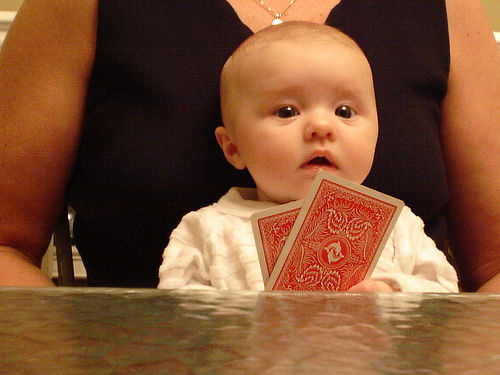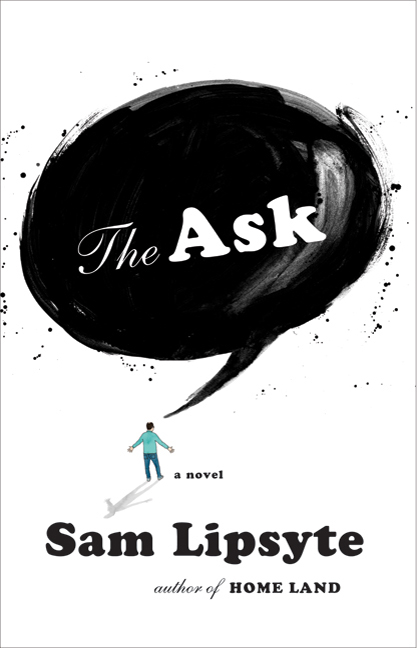Blake Butler
http://www.gillesdeleuzecommittedsuicideandsowilldrphil.com/
Blake Butler lives in Atlanta. His third book, There Is No Year, is forthcoming April 2011 from Harper Perennial.
http://www.gillesdeleuzecommittedsuicideandsowilldrphil.com/
Blake Butler lives in Atlanta. His third book, There Is No Year, is forthcoming April 2011 from Harper Perennial.

Many poker players will tell you that every hand is a story. In hold em, the four rounds of betting, the exposed community cards (given to the table in a set of three, then one more, then one more), and your two hole cards, are simply a skeletonic structure around which your action (the bet, the posture, the air around the table, speech, eyes) often are the body of what occurs. Many hands of poker fail to develop into powerful hands (i.e. both players have something but often not the nuts), thus the money frequently tends toward the player that can best present himself in a light that makes him seem provocative, working, putting fear in the other player. It becomes a question of who can tell the most believable story: if I believe that you have me crushed, and I acquiesce, it does not matter what you actually have.
The best poker players in the world, then, aren’t those who catch the most cards (as over time fate levels all), but those who are the most effective in masking their weakness, and exposing the weakness of the other. One of the biggest mistakes a neophyte makes when bluffing is failing to make their bluff make sense: they simply push hard, thinking that it is sheer aggression, and not calculated stories, images, that win pots. A common basic tactic of bluffing against a hand that had been strong early in the story is to bet “scare cards,” such as cards that complete a flush or straight draw, or betting an ace on the river when the high card had been a queen before. Betting as if the scare card completed your drawing hand, whether it does or not, can be enough to make weaker player fold. When scare cards don’t come, late bluffing is more easily picked off, as it is harder to give a player credit for a hand.
At higher levels, though, players are more aware of the tactics of storytelling. They are also aware that you are aware of them being aware, so the levels of who is representing what when and what do they think you think are constantly in flux, making high level poker play sometimes as exciting on a visceral level as writing that takes risks (both making it, and consuming it). There is a mash up of gut instinct, rational odds, emotional texture, board texture, physical surroundings (what do the opponent’s shoulders tell you about his or her hand? what do his or her eyes? how the chips are moved? the breathing. etc., not to mention the retro-image of what each player did three hours ago, three months ago, three years, up to right now), together create a continuity of immediate and retroactive value which in sum creates an environment to be processed, reacted to, explored, and yet is as cut and dry on the base level as a sentence printed on a page. Great players can seem as if they know exactly what you are holding in the midst of a hand. The greatest players go even beyond that, as if they not only see your hand, but now will draw you down another leg of the story, cause affect to you, do you some kind of rupture. Certain kinds of play, beyond money, can affect your spirit, your persona. A great session of poker, like an exceptionally great text, can make or break your month or year.
Chat Roulette Piano Improv Man [via Clusterflock]
Be cool.
Harp & Altar #7 is now available — with fantastic poetry and fiction by Cynthia Arrieu-King, Ana Božičević, Matthew Klane, Michael O’Brien, Alejandra Pizarnik translated by Jason Stumpf, Brett Price, Jared White, Edmond Caldwell, Susan Daitch, Luca Dipierro, Craig Foltz, A.D. Jameson, Matthew Kirkpatrick, and Azareen Van der Vliet Oloomi. Also: Farrah Field on Julia Cohen; Patrick Morrissey on Joshua Harmon and Rob Schlegel; Michael Newton’s gallery reviews; and art by Brandon Downing. | | | See also: the Harp & Altar anthology, featuring the first few years of the journal, in print, coming in June.
Wow. Forthcoming from OR Books. [via Clusterflock]
In literary America, to utter the name Gordon Lish in a conversation is like adding hot sauce to a meal. You either enjoy the zesty experience, one that pushes your limits or you prefer to stay away. Its Lish who, first as fiction editor at Esquire magazine (where he earned the nickname Captain Fiction) and then at the publisher Alfred A. Knopf, shaped the work of many of the country’s foremost writers, from Raymond Carver and Barry Hannah to Amy Hempel and Lily Tuck.
And as a writer himself, Lish’s stripped-down, brutally spare style earns accolades in increasing numbers. His oeuvre is coming to be recognized as among the most significant of the period that spans the transition between the 20th and 21st centuries. Kirkus Reviews wrote of his last collection that “Lish…is still our Joyce, our Beckett, our most true modernist.”
This definitive collection of Lishs short work includes a new foreword by the author and 106 stories, many of which Lish has revised exclusively for this edition. His observations are in turn achingly sad and wryly funny as they spark recognition of our common, clumsy humanity. There are no heroes here, except, perhaps, for all of us, as we muddle our way through life: they are stories of unfaithful husbands, inadequate fathers, restless children and writing teachers, men lost in their middle age: more often than not first-person tales narrated by one “Gordon Lish.” The take on life is bemused, satirical, and relentlessly accurate; the language unadorned: the result is a model of modernist prose and a volume of enduring literary craftsmanship.
Publication April 30, 2010 546 pages
Paperback $17 Ebook $10
Paperback and ebook $22
Two new I’m super excited about, coming soon from Sidebrow Books, do a get! … …

Sandy Florian
Collages by Alexis Anne Mackenzie
April 2010
ISBN: 0-9814975-1-9
104 pages, 6×8 full color, perfectbound, $20
“A bellow that is not a bucket. A bucket that is not a bone. There is wisdom in slipping into oceans. Into those wider organs horning. The way churches slip into twilight. Stone after stone. See the plaything on the mantel. I lean toward the paintings. See the baby fastened on the mast. I lean toward the window. See the sea, see the ship, see the ship’s low hull. See the winding of vowels by the function of the fist.”
For a preview of On Wonderland & Waste, go to http://www.sidebrow.net/books/wonderland-amp-waste

Selenography
Joshua Marie Wilkinson
Polaroids by Tim Rutili
April 2010
ISBN: 0-9814975-2-7
103 pages, 6×8 full color, perfectbound, $20
“an owl breaks the
fold a cut tree spills
a soft crutch
hits
this dust
a freezer stocked
with I
happened
to myself in these very woods.”
For a preview of Selenography, go to http://www.sidebrow.net/books/selenography
Both books are available until March 31 at a special discounted rate of $30 for the pair, 25 percent off the cover price.
On Wonderland & Waste, featuring full-color collages by Alexis Anne Mackenzie, and Selenography, featuring full-color Polaroids from Califone’s Tim Rutili, are also available separately for $18, a 10 percent preorder discount.
[The Tyrant writes in with thoughts on one of our most anticipated books of the year, Sam Lipsyte’s The Ask. Here’s Gian… – BB]

You got the new Lipsyte yet? That’s weird. Why not? You bought what instead? No you didn’t. Really? You really bought that? Were you Ex-Lax/Tampax-embarrassed at the counter when you bought that? You must have been. I wish I could have seen you there holding that stupid, stupid book. I wish I were behind you in line so I could’ve coughed all over you, said excuse me, then started up a conversation about the book you were getting ready to buy. I’d say I hadn’t heard much about the author (a lie) and then I’d ask if you knew anything about them. I’d laugh and laugh (on the inside). Then I’d ask why out of all these books are you buying this one. You will probably have called over security by now so, hey, I’ll back off. But really. You shouldn’t have bought that. Take it back. Trade it in for The Ask (can you even do that with books?).
Joking partly-aside, I’m sure whatever new book you bought is just great (I’m just trying out some dickish) but why not get another one? Venus Drive, Sam’s first book, was a huge one for me. I think I read DFW mention it somewhere, so I bought it, read it, fucking loved it, googled Sam, and that led me to an interview where he not only mentioned Lutz and Kimball and Michel but also Paley, Elkin, and Hannah, who were also unknown to me at the time. And it just snowballed from there. I had always just read “classics” up to that point, but paid closer attention to Faulkner and Conrad (both still my top major dudes). Sam was like my gateway drug to good indie-lit. And now I’m strapped in, begging like a bad kid, sucking anything they make me suck for the rare new good stuff.
Although I prefer Sam’s short stories to his novels (and this could be purely sentimental), The Ask is fantastic. Better than Home Land? Yes, in its way. Better than The Subject Steve? That depends. There is so much gorgeous shit in that one. How it got overlooked is fucking confounding. How Sam can keep great humor so close to this Old World romantic poetry should be noticed more than it has been. Like right here, when he’s fucking the cripple in The Subject Steve, he writes, “Compensation is not the word for what Renee does with her hands and her mouth to triumph over her dead half. I’ve discovered marooned colonies of feeling down there, too. We’ll lie under moonlight for hours, tell jokes, sing jingles, make puppets of our private parts. I’ll kiss her breasts, kiss the blue vein in one of them that must flow to her heart, a quiet river running through a church.”
That there is the shit I love love love.
Zack Wentz’s new web journal, New Dead Families, styles itself as “a cross between H.L. Gold’s Galaxy, and Gordon Lish’s the Quarterly, and/or Michael Moorcock’s New Worlds and Bradford Morrow’s Conjunctions.” New text by Stephen Graham Jones, Carol Novack, Colette Phair, myself, and several other wilds.
The Top 13 lists Top 13 novels about drugs, including our pal Tony O’Neill. I’ll personally take The Wild Boys over Junky any day. What else are they missing?
Extending auteur theory over to books, what authors with years and years of titles would you say have never published at least a semi-stinker? I think, immediately, Barry Hannah, Amy Hempel. Then I start to stall…